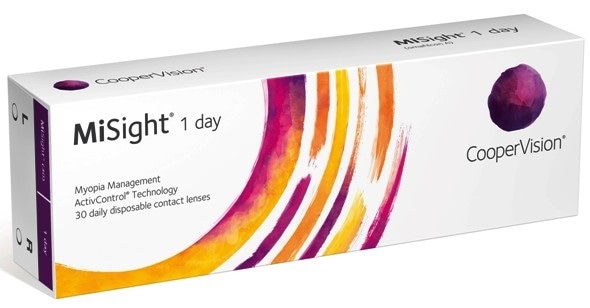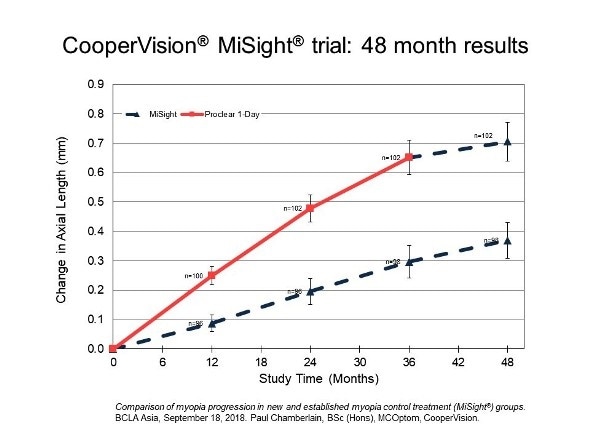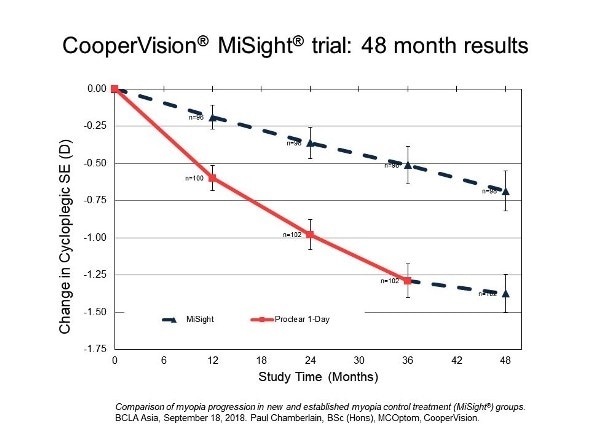Sep 19 2018
New four-year study data shows the significant impact of a pioneering contact lens management approach to slowing the progression of myopia (nearsightedness) in children, including those whose treatment begins later. CooperVision is presenting the multi-year study’s latest outcomes during the BCLA Asia conference in Singapore this week, at which the globally increasing prevalence of myopia is among the most widely discussed issues.

The ongoing clinical trial is assessing a specially-designed, dual-focus myopia control 1-day soft contact lens in reducing the rate of progression of juvenile-onset myopia. The lens is commercially available as CooperVision® MiSight® in select countries.
“Four-year results on the efficacy of our innovative myopia control lens represent a landmark in slowing myopia progression. The treatment is continuing to work for children who have been wearing MiSight® contact lenses for the entire study, and their axial length progression in this last year has slowed further. This illustrates the benefits of beginning myopia management as early as possible to maximize the benefit,” said Paul Chamberlain, Director of Research Programs for CooperVision.
After year three, myopia progression slowed in children wearing the MiSight® contact lens: 59% as measured by mean cycloplegic spherical equivalent (SE) and 52% as measured by mean axial elongation of the eye when compared to the children in the control group wearing a single vision 1-day contact lens.
In year four, children in the original control group were refit with the myopia control lens, and then continued to be tracked separately. Use of the dual-focus contact lens — which has alternating visual correction and treatment zones — was effective in slowing myopia progression in both groups:
- There was a significant reduction in myopic progression for the previous single vision 1-day wearers, indicating that MiSight® contact lenses are also effective when beginning myopia management at an older age.
- There were no significant differences between groups for change in Spherical Equivalent Refractive Error and Axial Length over 12 months.
- Axial length growth of 0.07mm in the MiSight® group and 0.06mm in the previous control group, compared to 0.10mm seen in the MiSight® group in year three, represents further myopia slowing as the children age.
- There were no significant differences in myopia progression rates for two demographically matched populations in their first versus fourth years of MiSight® contact lens wear.


No other prospective randomized controlled study has offered conclusive data for such a high degree of continued efficacy in myopia management using a 1-day soft contact lens over four years. The contact lens-based approach does not induce common side effects exhibited by some alternative pharmacological therapies.
The prevalence of myopia is projected to increase from approximately two billion people worldwide in 2010 to almost five billion people in 2050, bringing with it near- and long-term health challenge Not only does it create blurred vision, but also increases the likelihood of conditions later in life such as glaucoma, cataract, retinal detachment and myopic maculopathy if not addressed.
The four-year results are another great learning for CooperVision and the entire optical industry on the capability to slow the progression of myopia in children. Though children benefit at whatever age the treatment is started, the sooner their myopia is managed with MiSight® contact lenses, the more effect and benefit they receive in reducing final levels and the future risk of related vision impairment issues,”
said Stuart Cockerill, Senior Director, Myopia Management.
Physiological changes among 100 myopic children from Singapore, Canada, England, and Portugal were evaluated during the fourth year.